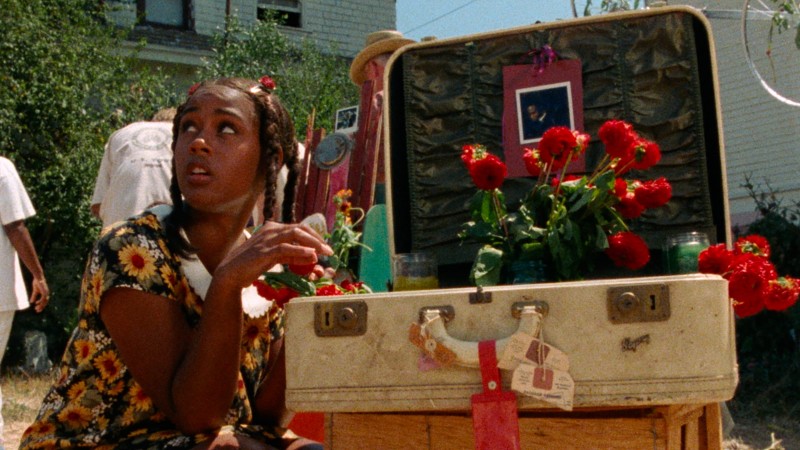Gaspar Noé's Movie Mania

On the night of the New York premiere of Gaspar Noé’s controversial new film Love , his 3D cinematic sex odyssey, the French-Argentine provocateur stopped by Criterion with the film’s star, Aomi Muyock. He instantly revealed himself to be far more reserved than one might expect of the man who brought us such incendiary films as I Stand Alone, Irreversible, and Enter the Void. In the course of a long conversation, it also became evident that Noé’s films, while undoubtedly spun from his own mind, all bear the marks of the filmmakers and artists he worships—in Love, for instance, witness the poster for Pier Paolo Pasolini’s Salò, or The 120 Days of Sodom hanging on the wall in a character’s bedroom; or, later, the John Carpenter song that creeps on over the soundtrack during a sex scene. Below are some highlights from our wide-ranging chat.

I find them mostly on eBay or in poster shops, and each time I go to a new country with one of my movies I ask everybody how I can buy movie posters. You often end up meeting someone who works at the cinematheque who knows collectors. I have a friend who has the biggest collection in the world of Jacques Tati posters, and Tarkovsky also. Some people are very focused and have one mania, and they spend nights working on that mania.
In my collection, the one I like the most is the poster for Fritz Lang’s M—the one that’s all black with the hand. I’ve heard there are just three copies all over the world and I’ve got one of them.
On Argentinian filmmaker Leonardo Favio:
Most Argentinian directors, if you ask them who is the best filmmaker, they will always say Leonardo Favio.
I’d start with Chronicle of a Boy Alone. It’s about a boy in a foster home—about his childhood. He has another called El romance del Aniceto y la Francisca, which is very spaced out. He also did documentaries. But he was a very, very popular love-song singer. At one point he was the best director in Argentina but he was making all his money from singing these love songs that were very sentimental. He was popular in Peru and Bolivia and Colombia. So he’d earn his money on these songs, and then he would spend the money doing movies. He really reminds me of the early Pasolini because he would use these young, very poor kids in Argentina but then have this classical music that makes it like religious. He also did a movie with Carlos Monzón—a big boxer from the ’70s—that is very weird. So he got the best boxer in Argentina and made him do an almost homosexual story between two losers. The movie is so weird that it was a total failure commercially.

It’s not about the eyes, it’s about what’s behind them. Pasolini’s Salò is so cruel, but it’s not the images that are cruel, it’s the whole plot and relationship between the characters. There is a great book on Salò by Gary Indiana, where he says that Pasolini identified with the victims and with the masters in the movie, because he was also a sex consumer and was both the good and the evil in the movie. So it’s not a movie about good or evil, because he had those two things inside him.
I remember when I saw Salò with my mother at the age of fifteen, she said, “I know you’re grown up now, you can watch this.” But the scene that shocked me the most in the whole movie is when there’s this solider fucking a girl while people are having dinner. There’s this old guy who sits next to the girl, and the guy moves from the ass of the girl to the ass of the old guy and the party keeps on going—it’s funny. There’s some black humor, but when you’re young and see that, you think, Oh, this is hell, this is the real fascist regime. But everything’s going on. The movie is more about whoever has the power to humiliate someone and enjoy doing it just to prove to himself that he has the power. In his last interview, Pasolini said he’s just like most people who are desperate to have power, but once they have it don’t know what to do with it, besides proving to themselves that they have it by submitting people to do things against their will. His last interviews were very good. He also said, in any religion, just replace the name of God with the ruling class or the ruling power, and then you understand.
The first time I saw Salò, it was hard to watch, and it took like twelve years to watch it again, but I’m obsessed with that movie.
I find that documentaries are hard to watch because you know that it’s real; those films are harder to watch than any narrative movie.
On Irreversible:
With Irreversible , it’s all fake. You know it’s a movie with movie stars, and from that moment on, you know it’s all fake. It’s just people pretending; it’s all a representation of violence, it’s not real violence. You have the same thing when you watch Salò—you know it’s violence with actors. I would say Salò is difficult to digest. It’s not so hard to watch; it’s more difficult to digest, because no one is good and no one is bad in the movie—all of humankind is rotten from the inside. It’s a movie about reptiles—it’s not a movie about mammals or humans. On your edition of Salò, you have a making-of and you see they were all laughing on the set during the torture scenes. I remember when I shot the rape scene with Monica, we were watching the takes on the monitor, and she was laughing, saying, “Oh, people are going to scream when they see this, it’s so real!” She was happy, so the mood was joyful and the shooting was joyful. They succeeded in doing a good magic trick.
But Irreversible was an accidental movie. It was not meant to be—I just needed to pay my rent. I couldn’t get the other movies started. I had two other projects in mind, so while I did this I was also rehearsing things for my main project, which was Enter the Void.

On work:
I would say I relate to Luis Buñuel, when he says, “Never do for money what you wouldn’t do for free. Work is for slaves.” That guy was right.





